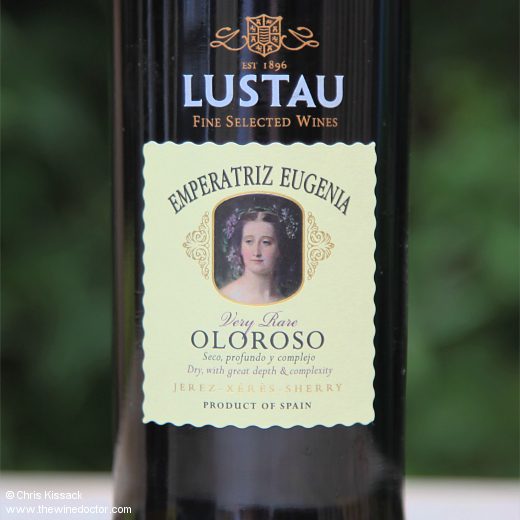Lustau Oloroso Emperatriz Eugenia
You’re at a festive family gathering, currently head to head in the final stages of a tense game of Trivial Pursuit. Only one segment in your counter remains empty, but worryingly the subject matter which stands between you and victory is your bête noire, history. Nevertheless, Lady Luck is on your side, as you roll a six, and land on the history wedge space. You cross all your fingers and toes and pray to The Gods of Trivia for an easy question.
Which team won the Football World Cup in 1966?
Who partnered Scully in the X-Files?
Which American wine critic was famed for his adulation of garagiste St Emilion as well as the 1982 Bordeaux vintage?
Any of those would do.
In the stark silence that falls across those gathered around the board you could hear a pin drop. Your opponent fixes you with a steely glare, then scans the question on the card, visibly relaxing as they do so. They believe they have the upper hand.
“Who was the last Empress of France?”
“Ahhh,” you reply, keeping your sudden elation under control, as you gently swirl your festive glassful of sherry, “now that’s an easy one.”
-o-
The Empress in question was Eugenia de Montijo (1826 – 1920). Having been born in Granada, Eugenia was Spanish by birth, although her mother had Scottish roots, her Scottish grandfather a well-known wine merchant. But she would one day be Empress, under the slightly more Francophone name of Eugénie.

Following her education in Paris and Bristol, she and her mother – a notable society hostess – spent their time rubbing shoulders with all Europe’s nobility, and during the course of a reception at the Élysée Palace in 1849 she met the young Prince Louis Napoléon (1808 – 1873), the nephew of Napoléon Bonaparte (1769 – 1821). Four years later in 1853 the prince became emperor, styling himself Napoléon III, Emperor of the French. Shortly afterwards Napoléon III took Eugenia as his wife. She thus assumed the title of Empress Consort of the French, one which she held until 1870 when her husband was deposed following his defeat and capture at the Battle of Sedan, which ended the Franco-Prussian war.
Similarly stripped of her title Eugenia spent much of her remaining life in Spain, and it was in 1921 that Don Emilion Lustau was moved to found a new sherry solera bearing her name. It is often said it was created to commemorate a visit she made to Jerez that year, but given that she died in Madrid in 1920 this seems rather unlikely, unless she possessed a remarkable post-mortem commitment to her civic duties. It is rather more likely that the solera was created to memorialise her life following her passing, and to commemorate her philanthropy, which included the donation of her steam yacht to the British Navy on the outbreak of World War I, and financial support for a number of French military hospitals during the same conflict.
Still produced from that same solera more than a century later, the Emperatriz Eugenia is a traditional oloroso, having undergone a long period of oxidative maturation, and the average age of the wine in the solera is said to be between fifteen and twenty years. In the glass it presents a rich walnut-mahogany hue, and this is followed by an open and fragrant nose, bursting with the scents of toasted almonds first and foremost, nuanced with baked orange, dusty earth and brined green olive. The palate is very cool, dry but richly composed and sinewy, light-footed with a lovely sense of savoury umami and drive. Through the middle it hunkers down a little, showing a much more solid and substantial build, but still with a little of the energy hinted at on the nose, all toast and olive, with tingling acidity and a rapidly building warmth which dominates the finish and length. With a remarkable persistence, this is a confident oloroso which seems to linger forever, and it seems like a fitting tribute to the last Empress of France. From a 500 ml bottle, and the alcohol declared on the label is 20%. 93/100
-o-
You make eye contact with your competitors, and pause for dramatic effect, before you reveal your answer.
“Empress Eugénie,” is your ‘guess’, quickly revealed – to gasps of astonishment and adulation (at a level usually reserved for that 1982 vintage, but perhaps not those garagiste wines from St Emilion) – to be correct.
You collect your history wedge, and roll again, as your thoughts turn to more important matters, such as the now pressing need to top up your nearly empty glass of Lustau’s Emperatriz Eugenia. (23/12/24)
